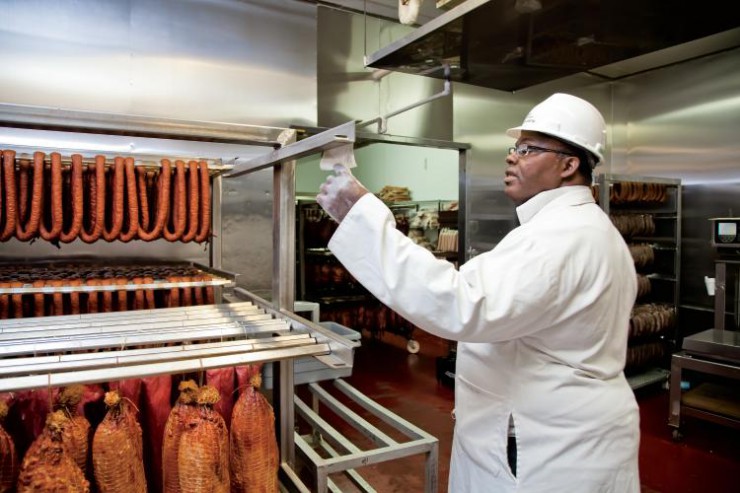Home > Illinois > Illinois Farm to Table > Illinois Inspections Protect Consumers
Illinois Inspections Protect Consumers

Jim Kunkle is well aware of past outbreaks of foot-and-mouth disease in England and more recently in Japan and South Korea, that cost those countries billions of dollars in agricultural losses. He doesn’t want such an outbreak to happen in Illinois.
Kunkle is manager of Emergency Programs for the Illinois Department of Agriculture, and says foot-and-mouth disease is the IDOA’s biggest scare. An emergency response plan is in place if the disease ever breaks out in Illinois and threatens the livestock industry.
“Foot-and-mouth is one of the most infectious diseases known to man, affecting cloven-hoofed livestock like cattle, swine, sheep, goats and deer,” he says. “It’s a severe plague that spreads from animal to animal through aerosols, contact with contaminated farming equipment, vehicles, clothing or feed, and by domestic and wild predators, infecting the animals with high fever and blisters. If such an emergency occurred, response measures could include quarantines, herd depopulation, carcass disposal, vaccination, as well as stopped and/or controlled movement in and out of infected areas.”
Kunkle says the disease could be accidentally transported to the U.S., but someone might also intentionally bring the disease into the country, in a blatant act of agro-terrorism.
“Agro-terrorism is defined as a deliberate introduction, use or threatened use of a chemical, biological, radiological, nuclear or explosive agent against one or more components of the food or agriculture sectors,” he says. “The IDOA works closely with the FBI and representatives from the beef, pork, dairy, poultry, soybean, corn, and feed and fertilizer associations, all for the ultimate protection of Illinois consumers.”
Kunkle says the IDOA also collaborates with the U.S. Department of Agriculture and a consortuim of agriculture departments from 13 other Midwestern states to prepare against all forms of agro-terrorism.

Beefed-Up Security
The IDOA also protects consumers by conducting quality-control inspections within a variety of individual food sectors. For example, Illinois is regarded as one of the top three meat inspection states in the country. “No slaughterhouse in Illinois operates without one of our field personnel being present to inspect every carcass or every bird during the harvesting process,” says Dr. Kris Mazurczak, chief of the IDOA Bureau of Meat and Poultry Inspection. “There are 60 slaughterhouses in Illinois, and our 110 field personnel inspected 908,811 head of livestock in fiscal 2011.”
Mazurczak says every animal is inspected while alive, then examined postmortem. “We observe internal organs, carcasses and lymph nodes, and employ veterinarians in case an inspector notices any abnormalities such as lesions or pathologies,” he says.

Grade A Inspections
The egg industry in Illinois is also highly regulated, and IDOA egg program manager Suzanne Moss says inspectors check arbitrary eggs for quality, damage, weight, sanitation and labeling.
“Our staff obviously can’t observe every egg in Illinois, so we conduct random visits to distribution points such as warehouses, grocery stores, restaurants, hospitals and nursing homes,” she says. “If a substandard egg is found, the carton is pulled and the distributor is told about it.”
Moss says warning messages are sent to alert distributors of any problem. “Most distributors want to do the right thing, and appreciate us bringing any issue to their attention,” she says. “We are all after the same goal – a good, quality egg for Illinois consumers.”



